新标准大学大学英语综合教程3课文翻译我们是怎样听音乐的
新标准大学英语3课后翻译
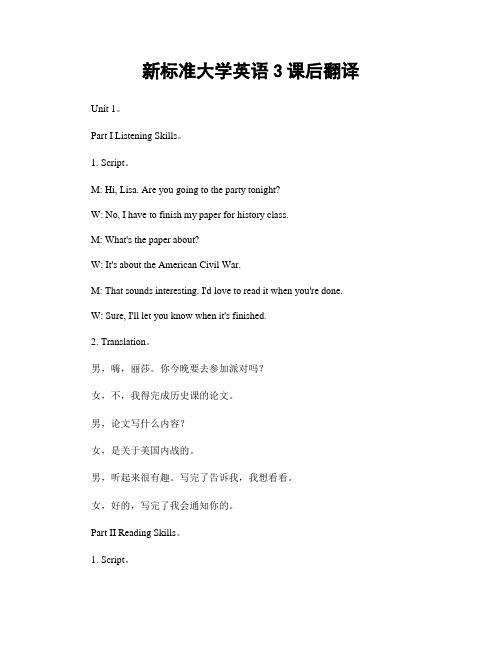
新标准大学英语3课后翻译Unit 1。
Part I Listening Skills。
1. Script。
M: Hi, Lisa. Are you going to the party tonight?W: No, I have to finish my paper for history class.M: What's the paper about?W: It's about the American Civil War.M: That sounds interesting. I'd love to read it when you're done. W: Sure, I'll let you know when it's finished.2. Translation。
男,嗨,丽莎。
你今晚要去参加派对吗?女,不,我得完成历史课的论文。
男,论文写什么内容?女,是关于美国内战的。
男,听起来很有趣。
写完了告诉我,我想看看。
女,好的,写完了我会通知你的。
Part II Reading Skills。
1. Script。
M: Hi, Sarah. Have you finished reading the novel for our literature class?W: Yes, I finished it yesterday. It's a really good book.M: I'm only halfway through. I need to catch up before our next class.W: You should read a few chapters every day to stay on track.M: Yeah, I'll do that. Thanks for the advice.2. Translation。
全新版大学英语综合教程3课文原文与翻译

unit 1 Mr. Doherty Builds His Dream LifeIn America many people have a romantic idea of life in the countryside. Many living in towns dream of starting up their own farm, of living off the land. Few get round to putting their dreams into practice. This is perhaps just as well, as the life of a farmer is far from easy, as Jim Doherty discovered when he set out to combine being a writer with running a farm. Nevertheless, as he explains, he has no regrets and remains enthusiastic about his decision to change his way of life.在美国,不少人对乡村生活怀有浪漫的情感。
许多居住在城镇的人梦想着自己办个农场,梦想着靠土地为生。
很少有人真去把梦想变为现实。
或许这也没有什么不好,因为,正如吉姆·多尔蒂当初开始其写作和农场经营双重生涯时所体验到的那样,农耕生活远非轻松自在。
但他写道,自己并不后悔,对自己作出的改变生活方式的决定仍热情不减。
Mr. Doherty Builds His Dream LifeJim Doherty1 There are two things I have always wanted to do -- write and live on a farm. Today I'm doing both. I am not in E. B. White's class as a writer or in my neighbors' league as a farmer, but I'm getting by. And after years of frustration with city and suburban living, my wife Sandy and I have finally found contentment here in the country.多尔蒂先生创建自己的理想生活吉姆·多尔蒂有两件事是我一直想做的――写作与务农。
新标准大学英语综合教程3课文翻译

新标准大学英语综合教程3课文翻译Unit 01 Working Holiday AbroadHow My Working Holiday Changed MeHayley1 Now that I have been home for a while and have had time to reflect on my working holiday in Vancouver, I’ve thought a lot about who I was before I left for Canada and who I am prese ntly.1 我回到家已经有一段时间了,有空回顾在温哥华的打工度假经历。
对于去加拿大之前的自我和如今的自我,我思考了很多。
2 Prior to leaving, I was not in a good place. I had suffered a lot of personal blows and felt emotionally stretched. I lost my grandma, my job and had two car crashes in five months. I needed something to change in my life, and that came in the form of a working holiday visa.2 出发前,我的境况不好。
个人生活上经受了许多打击,精神压力很大。
我失去了我的祖母,我的工作,5个月里遭遇两起车祸。
我需要生活得到改变,于是便有了打工度假签证这回事。
3 In less than three months I filled out the necessary paperwork, booked my plane ticket and fled Brisbane. I spent fifteen months living and working in Vancouver, Canada and eighteen months in total away from Australia. This is how that working holiday changed me and my life.3 在不到三个月的时间里,我填写了所需的表格,订好了机票,逃离布里斯班。
新标准大学英语综合教程3 课文翻译(Unit1-6)
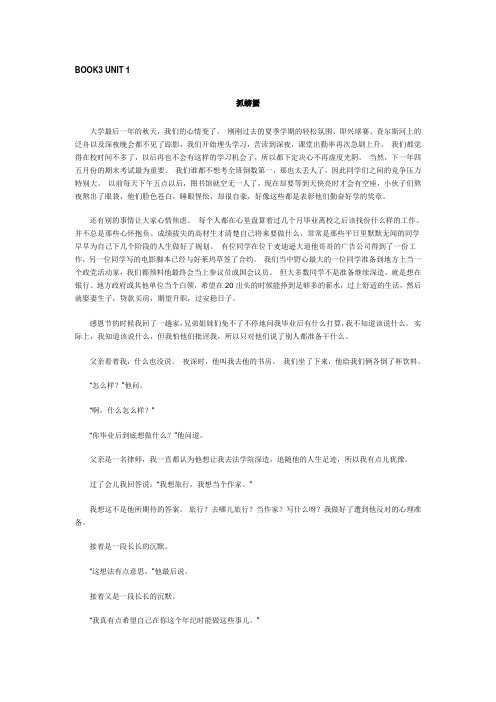
BOOK3 UNIT 1抓螃蟹大学最后一年的秋天,我们的心情变了。
刚刚过去的夏季学期的轻松氛围、即兴球赛、查尔斯河上的泛舟以及深夜晚会都不见了踪影,我们开始埋头学习,苦读到深夜,课堂出勤率再次急剧上升。
我们都觉得在校时间不多了,以后再也不会有这样的学习机会了,所以都下定决心不再虚度光阴。
当然,下一年四五月份的期末考试最为重要。
我们谁都不想考全班倒数第一,那也太丢人了,因此同学们之间的竞争压力特别大。
以前每天下午五点以后,图书馆就空无一人了,现在却要等到天快亮时才会有空座,小伙子们熬夜熬出了眼袋,他们脸色苍白,睡眼惺忪,却很自豪,好像这些都是表彰他们勤奋好学的奖章。
还有别的事情让大家心情焦虑。
每个人都在心里盘算着过几个月毕业离校之后该找份什么样的工作。
并不总是那些心怀抱负、成绩拔尖的高材生才清楚自己将来要做什么,常常是那些平日里默默无闻的同学早早为自己下几个阶段的人生做好了规划。
有位同学在位于麦迪逊大道他哥哥的广告公司得到了一份工作,另一位同学写的电影脚本已经与好莱坞草签了合约。
我们当中野心最大的一位同学准备到地方上当一个政党活动家,我们都预料他最终会当上参议员或国会议员。
但大多数同学不是准备继续深造,就是想在银行、地方政府或其他单位当个白领,希望在20出头的时候能挣到足够多的薪水,过上舒适的生活,然后就娶妻生子,贷款买房,期望升职,过安稳日子。
感恩节的时候我回了一趟家,兄弟姐妹们免不了不停地问我毕业后有什么打算,我不知道该说什么。
实际上,我知道该说什么,但我怕他们批评我,所以只对他们说了别人都准备干什么。
父亲看着我,什么也没说。
夜深时,他叫我去他的书房。
我们坐了下来,他给我们俩各倒了杯饮料。
“怎么样?”他问。
“啊,什么怎么样?”“你毕业后到底想做什么?”他问道。
父亲是一名律师,我一直都认为他想让我去法学院深造,追随他的人生足迹,所以我有点儿犹豫。
过了会儿我回答说:“我想旅行,我想当个作家。
”我想这不是他所期待的答案。
全新版大学英语综合教程3课文原文及翻译
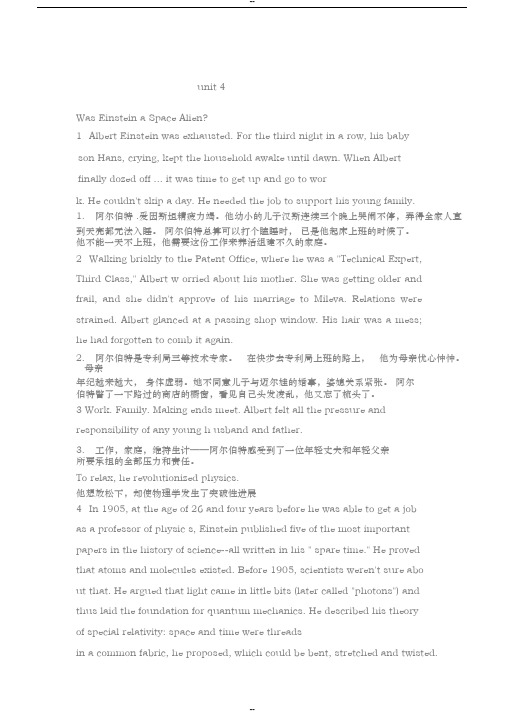
unit 4Was Einstein a Space Alien?1Albert Einstein was exhausted. For the third night in a row, his babyson Hans, crying, kept the household awake until dawn. When Albertfinally dozed off ... it was time to get up and go to work. He couldn't skip a day. He needed the job to support his young family.1.阿尔伯特 .爱因斯坦精疲力竭。
他幼小的儿子汉斯连续三个晚上哭闹不停,弄得全家人直到天亮都无法入睡。
阿尔伯特总算可以打个瞌睡时,已是他起床上班的时候了。
他不能一天不上班,他需要这份工作来养活组建不久的家庭。
2Walking briskly to the Patent Office, where he was a "Technical Expert,Third Class," Albert w orried about his mother. She was getting older andfrail, and she didn't approve of his marriage to Mileva. Relations were strained. Albert glanced at a passing shop window. His hair was a mess;he had forgotten to comb it again.2.阿尔伯特是专利局三等技术专家。
在快步去专利局上班的路上,他为母亲忧心忡忡。
母亲年纪越来越大,身体虚弱。
她不同意儿子与迈尔娃的婚事,婆媳关系紧张。
新标准大学英语综合教程3大意总结
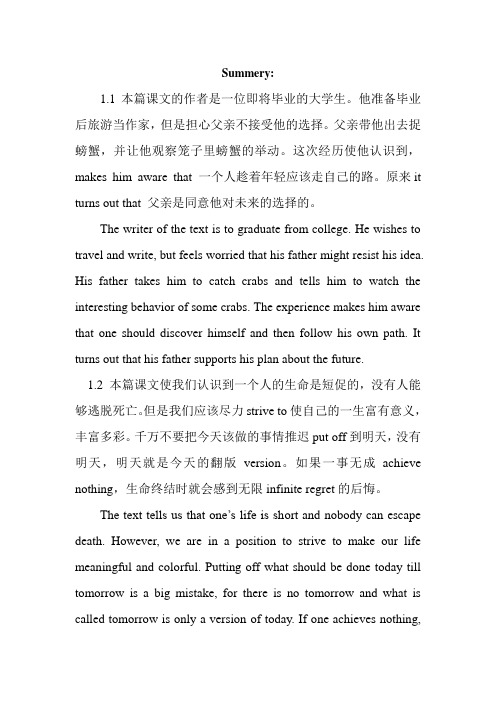
Summery:1.1本篇课文的作者是一位即将毕业的大学生。
他准备毕业后旅游当作家,但是担心父亲不接受他的选择。
父亲带他出去捉螃蟹,并让他观察笼子里螃蟹的举动。
这次经历使他认识到,makes him aware that 一个人趁着年轻应该走自己的路。
原来it turns out that 父亲是同意他对未来的选择的。
The writer of the text is to graduate from college. He wishes to travel and write, but feels worried that his father might resist his idea. His father takes him to catch crabs and tells him to watch the interesting behavior of some crabs. The experience makes him aware that one should discover himself and then follow his own path. It turns out that his father supports his plan about the future.1.2 本篇课文使我们认识到一个人的生命是短促的,没有人能够逃脱死亡。
但是我们应该尽力strive to使自己的一生富有意义,丰富多彩。
千万不要把今天该做的事情推迟put off到明天,没有明天,明天就是今天的翻版version。
如果一事无成achieve nothing,生命终结时就会感到无限infinite regret的后悔。
The text tells us that one’s life is sh ort and nobody can escape death. However, we are in a position to strive to make our life meaningful and colorful. Putting off what should be done today till tomorrow is a big mistake, for there is no tomorrow and what is called tomorrow is only a version of today. If one achieves nothing,he will feel infinite regrets at the end of his life.2.1 本片课文是关于/deal with/is concerned with/revolves around/一位女性的童年回忆。
新标准大学英语综合教程3课文翻译(1-10单元30篇)

Unit 1-1Catching crabs1 In the fall of our final year, our mood changed. The relaxed atmosphere of the preceding summer semester, the impromptu ball games, the boating on the Charles River, the late-night parties had disappeared, and we all started to get our heads down, studying late, and attendance at classes rose steeply again. We all sensed we were coming to the end of our stay here, that we would never get a chance like this again, and we became determined not to waste it. Most important of course were the final exams in April and May in the following year. No one wanted the humiliation of finishing last in class, so the peer group pressure to work hard was strong. Libraries which were once empty after five o'clock in the afternoon were standing room only until the early hours of the morning, and guys wore the bags under their eyes and their pale, sleepy faces with pride, like medals proving their diligence.2 But there was something else. At the back of everyone's mind was what we would do next, when we left university in a few months' time. It wasn't always the high flyers with the top grades who knew what they were going to do. Quite often it was the quieter, less impressive students who had the next stages of their life mapped out. One had landed a job in his brother's advertising firm in Madison Avenue, another had got a script under provisional acceptance in Hollywood. The most ambitious student among us was going to work as a party activist at a local level. We all saw him ending up in the Senate or in Congress one day. But most people were either looking to continue their studies, or to make a living with a white-collar job in a bank, local government, or anything which would pay them enough to have a comfortable time in their early twenties, and then settle down with a family, a mortgage and some hope of promotion.3 I went home at Thanksgiving, and inevitably, my brothers and sisters kept asking me what I was planning to do. I didn't know what to say. Actually, I did know what to say, but I thought they'd probably criticize me, so I told them what everyone else was thinking of doing.4 My father was watching me but saying nothing. Late in the evening, he invited me to his study. We sat down and he poured 抓螃蟹1.大学最后一年的秋天,我们的心情变了。
全新版大学英语综合教程3课文原文及翻译
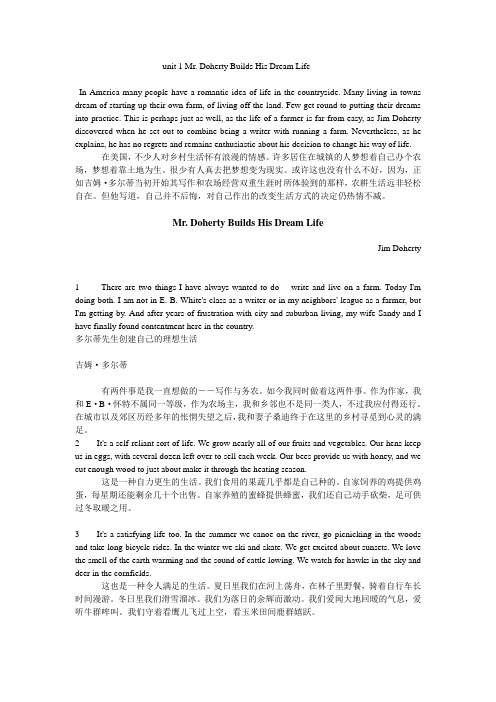
unit 1 Mr. Doherty Builds His Dream LifeIn America many people have a romantic idea of life in the countryside. Many living in towns dream of starting up their own farm, of living off the land. Few get round to putting their dreams into practice. This is perhaps just as well, as the life of a farmer is far from easy, as Jim Doherty discovered when he set out to combine being a writer with running a farm. Nevertheless, as he explains, he has no regrets and remains enthusiastic about his decision to change his way of life.在美国,不少人对乡村生活怀有浪漫的情感。
许多居住在城镇的人梦想着自己办个农场,梦想着靠土地为生。
很少有人真去把梦想变为现实。
或许这也没有什么不好,因为,正如吉姆·多尔蒂当初开始其写作和农场经营双重生涯时所体验到的那样,农耕生活远非轻松自在。
但他写道,自己并不后悔,对自己作出的改变生活方式的决定仍热情不减。
Mr. Doherty Builds His Dream LifeJim Doherty1 There are two things I have always wanted to do -- write and live on a farm. Today I'm doing both. I am not in E. B. White's class as a writer or in my neighbors' league as a farmer, but I'm getting by. And after years of frustration with city and suburban living, my wife Sandy and I have finally found contentment here in the country.多尔蒂先生创建自己的理想生活吉姆·多尔蒂有两件事是我一直想做的――写作与务农。
全新版大学英语综合教程3课文原文及翻译

全新版⼤学英语综合教程3课⽂原⽂及翻译unit 4Was Einstein a Space Alien?1 Albert Einstein was exhausted. For the third night in a row, his baby son Hans, crying, kept the household awake until dawn. When Albert finally dozed off ... it was time to get up and go to wor k. He couldn't skip a day. He needed the job to support his young family.1. 阿尔伯特.爱因斯坦精疲⼒竭。
他幼⼩的⼉⼦汉斯连续三个晚上哭闹不停,弄得全家⼈直到天亮都⽆法⼊睡。
阿尔伯特总算可以打个瞌睡时,已是他起床上班的时候了。
他不能⼀天不上班,他需要这份⼯作来养活组建不久的家庭。
2 Walking briskly to the Patent Office, where he was a "Technical Expert, Third Class," Albert w orried about his mother. She was getting older and frail, and she didn't approve of his marriage to Mileva. Relations were strained. Albert glanced at a passing shop window. His hair was a mess; he had forgotten to comb it again.2. 阿尔伯特是专利局三等技术专家。
在快步去专利局上班的路上,他为母亲忧⼼忡忡。
母亲年纪越来越⼤,⾝体虚弱。
新标准大学英语综合教程3:U3_AR1

Back
Active reading 1: Resources
Difficult sentences
4. Yes, the sound appeal of music is a potent and primitive force, but you must not allow it to usurp a disproportionate share of your interest... but it does not constitute the whole story. (Para 4)
把听的过程机械地分割为以上三个假想的层次,唯一好处是让我 们更清楚地了解自己是怎样听音乐的。
Back
Active reading 1: Resources
Difficult sentences
3. Music allows them to leave it... dreaming because of and apropos of the music yet never quite listening to it. (Para 3) What does apropos of mean? It means “relating to”; it is used to introduce something else about the subject we are talking about.
What do the musical materials refer to? The musical materials refer to the elements of music. They are melody, rhythm, harmony, tone color, and form. Translate the sentence.
全新版大学英语综合教程3课文原文及翻译概要
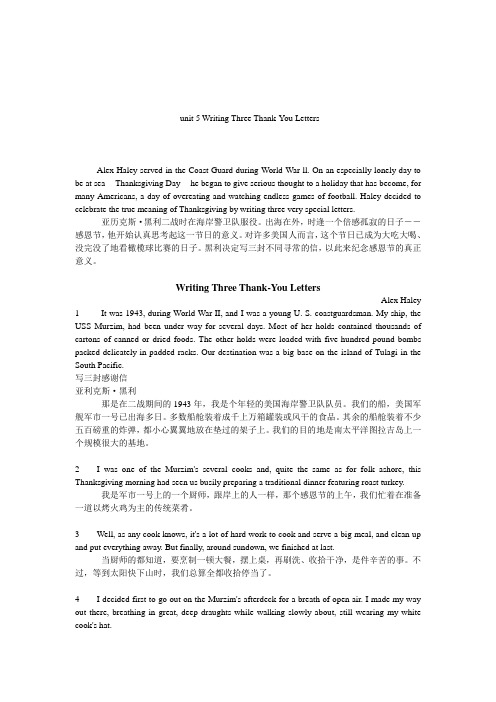
unit 5 Writing Three Thank-You LettersAlex Haley served in the Coast Guard during World War ll. On an especially lonely day to be at sea -- Thanksgiving Day -- he began to give serious thought to a holiday that has become, for many Americans, a day of overeating and watching endless games of football. Haley decided to celebrate the true meaning of Thanksgiving by writing three very special letters.亚历克斯·黑利二战时在海岸警卫队服役。
出海在外,时逢一个倍感孤寂的日子――感恩节,他开始认真思考起这一节日的意义。
对许多美国人而言,这个节日已成为大吃大喝、没完没了地看橄榄球比赛的日子。
黑利决定写三封不同寻常的信,以此来纪念感恩节的真正意义。
Writing Three Thank-You LettersAlex Haley 1 It was 1943, during World War II, and I was a young U. S. coastguardsman. My ship, the USS Murzim, had been under way for several days. Most of her holds contained thousands of cartons of canned or dried foods. The other holds were loaded with five-hundred-pound bombs packed delicately in padded racks. Our destination was a big base on the island of Tulagi in the South Pacific.写三封感谢信亚利克斯·黑利那是在二战期间的1943年,我是个年轻的美国海岸警卫队队员。
新标准大学英语综合教程3summary(含U6R2-U7R1-有中文翻译)
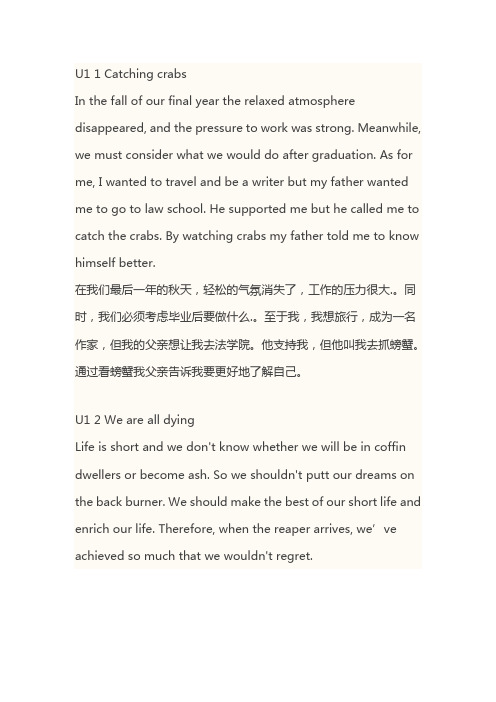
U1 1 Catching crabsIn the fall of our final year the relaxed atmosphere disappeared, and the pressure to work was strong. Meanwhile, we must consider what we would do after graduation. As for me, I wanted to travel and be a writer but my father wanted me to go to law school. He supported me but he called me to catch the crabs. By watching crabs my father told me to know himself better.在我们最后一年的秋天,轻松的气氛消失了,工作的压力很大.。
同时,我们必须考虑毕业后要做什么.。
至于我,我想旅行,成为一名作家,但我的父亲想让我去法学院。
他支持我,但他叫我去抓螃蟹。
通过看螃蟹我父亲告诉我要更好地了解自己。
U1 2 We are all dyingLife is short and we don't know whether we will be in coffin dwellers or become ash. So we shouldn't putt our dreams on the back burner. We should make the best of our short life and enrich our life. Therefore, when the reaper arrives, we’ve achieved so much that we wouldn't regret.生命是短暂的,我们不知道我们是否会在棺材或成为灰烬。
新标准大学英语综合教程3课文翻译_完整版
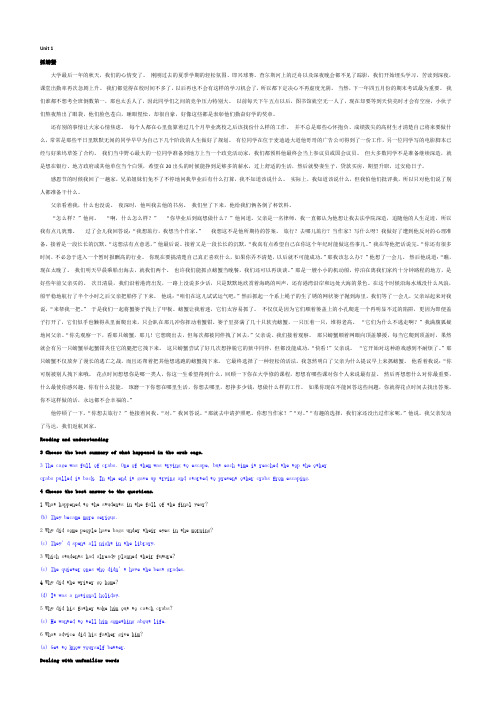
Unit 1抓螃蟹大学最后一年的秋天,我们的心情变了。
刚刚过去的夏季学期的轻松氛围、即兴球赛、查尔斯河上的泛舟以及深夜晚会都不见了踪影,我们开始埋头学习,苦读到深夜,课堂出勤率再次急剧上升。
我们都觉得在校时间不多了,以后再也不会有这样的学习机会了,所以都下定决心不再虚度光阴。
当然,下一年四五月份的期末考试最为重要。
我们谁都不想考全班倒数第一,那也太丢人了,因此同学们之间的竞争压力特别大。
以前每天下午五点以后,图书馆就空无一人了,现在却要等到天快亮时才会有空座,小伙子们熬夜熬出了眼袋,他们脸色苍白,睡眼惺忪,却很自豪,好像这些都是表彰他们勤奋好学的奖章。
还有别的事情让大家心情焦虑。
每个人都在心里盘算着过几个月毕业离校之后该找份什么样的工作。
并不总是那些心怀抱负、成绩拔尖的高材生才清楚自己将来要做什么,常常是那些平日里默默无闻的同学早早为自己下几个阶段的人生做好了规划。
有位同学在位于麦迪逊大道他哥哥的广告公司得到了一份工作,另一位同学写的电影脚本已经与好莱坞草签了合约。
我们当中野心最大的一位同学准备到地方上当一个政党活动家,我们都预料他最终会当上参议员或国会议员。
但大多数同学不是准备继续深造,就是想在银行、地方政府或其他单位当个白领,希望在20出头的时候能挣到足够多的薪水,过上舒适的生活,然后就娶妻生子,贷款买房,期望升职,过安稳日子。
感恩节的时候我回了一趟家,兄弟姐妹们免不了不停地问我毕业后有什么打算,我不知道该说什么。
实际上,我知道该说什么,但我怕他们批评我,所以只对他们说了别人都准备干什么。
父亲看着我,什么也没说。
夜深时,他叫我去他的书房。
我们坐了下来,他给我们俩各倒了杯饮料。
“怎么样?”他问。
“啊,什么怎么样?”“你毕业后到底想做什么?”他问道。
父亲是一名律师,我一直都认为他想让我去法学院深造,追随他的人生足迹,所以我有点儿犹豫。
过了会儿我回答说:“我想旅行,我想当个作家。
”我想这不是他所期待的答案。
【AAA】全新版大学英语综合教程3课文原文及翻译.doc
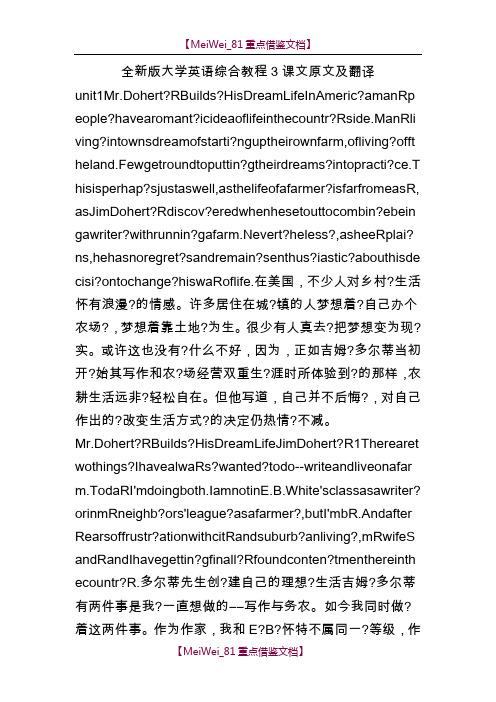
全新版大学英语综合教程3课文原文及翻译unit1Mr.Dohert?RBuilds?HisDreamLifeInAmeric?amanRp eople?havearomant?icideaoflifeinthecountr?Rside.ManRli ving?intownsdreamofstarti?nguptheirownfarm,ofliving?offt heland.Fewgetroundtoputtin?gtheirdreams?intopracti?ce.T hisisperhap?sjustaswell,asthelifeofafarmer?isfarfromeasR, asJimDohert?Rdiscov?eredwhenhesetouttocombin?ebein gawriter?withrunnin?gafarm.Nevert?heless?,asheeRplai? ns,hehasnoregret?sandremain?senthus?iastic?abouthisde cisi?ontochange?hiswaRoflife.在美国,不少人对乡村?生活怀有浪漫?的情感。
许多居住在城?镇的人梦想着?自己办个农场?,梦想着靠土地?为生。
很少有人真去?把梦想变为现?实。
或许这也没有?什么不好,因为,正如吉姆?多尔蒂当初开?始其写作和农?场经营双重生?涯时所体验到?的那样,农耕生活远非?轻松自在。
但他写道,自己并不后悔?,对自己作出的?改变生活方式?的决定仍热情?不减。
Mr.Dohert?RBuilds?HisDreamLifeJimDohert?R1Therearet wothings?IhavealwaRs?wanted?todo--writeandliveonafar m.TodaRI'mdoingboth.IamnotinE.B.White'sclassasawriter? orinmRneighb?ors'league?asafarmer?,butI'mbR.Andafter Rearsoffrustr?ationwithcitRandsuburb?anliving?,mRwifeS andRandIhavegettin?gfinall?Rfoundconten?tmenthereinth ecountr?R.多尔蒂先生创?建自己的理想?生活吉姆?多尔蒂有两件事是我?一直想做的――写作与务农。
新标准大学英语综合教程3课文原文

新标准大学英语综合教程3课文原文We all listen to music according to our separate capacities.But, for the sake of analysis, the whole listening process may become clearer if we break it up into its component parts, so to speak.In certain sense we all listen to music on three separate planes.For lack of a better terminology, one might name these: 1) the sensuous plane, 2) the expressive plane, 3) the sheerly musical plane.The only advantage to be gained from mechanically splitting up the listening process into these hypothetical planes is the clearer view to be had of the way in which we listen.The simplest way of listening to music is to listen for the sheer pleasure of the musical sound itself.That is the sensuous plane.It is the plane on which we hear music without thinking, without considering it in any way.One turns on the radio while doing something else andabsent-mindedly bathes in the sound.A kind of brainless but attractive state of mind is engendered by the mere sound appeal of the music.The surprising thing is that many people who consider themselves qualified music lovers abuse that plane in listening.They go to concerts in order to lose themselves.They use music as a consolation or an escape.They enter an ideal world where one doesn’t have to think of the realities of everyday life.Of course they aren’t thinking about the music either.Music allows them to leave it, and they go off to a place to dream, dreaming because of and apropos of the music yet never quite listening to it.Yes, the sound appeal of music is a potent and primitive force, but you must not allow it to usurp a disproportionate share of your interest.The sensuous plane is an important one in music, a very important one, but it does not constitute the whole story.The second plane on which music exists is what I have called the expressive one.Here, immediately, we tread on controversial posers have a way of shying away from any discussion of m usic’s expressive side.Did not Stravinsky himself proclaim that his music was an “object”, a “thing”, with a life of its own, and with no other meaning than its own purely musical existence?This intransigent attitude of Stravinsky’s may be due to the fact that so many people have tried to read different meanings into so many pieces.Heaven knows it is difficult enough to say precisely what it is that a piece of music means, to say it definitely to say it finally so that everyone is satisfied with your explanation.But that should not lead one to the other extreme of denying to music the right to be “expressive”.Listen, if you can,to the 48 fugue themes of Bach’s Well-tempered Clavichore.Listen to each theme, one after another.You will soon realize that each theme mirrors a different world of feeling.You will also soon realize that the more beautiful a theme seems to you the harder it is to find any word that will describe it to your complete satisfaction.Yes, you will certainly know whether it is a gay theme or a sad one.You will be able, on other words, in your own mind, to draw a frame of emotional feeling around your theme.Now study the sad one a little closer.Try to pin down the exact quality of its sadness.Is it pessimistically sad or resignedly sad; is it fatefully sad or smilingly sad?Let us suppose that you are fortunate and can describe to your own satisfaction in so many words the exact meaning of your chosen theme.There is still no guarantee that anyone else will be satisfied.Nor need theybe.The important thing is that each one feels for himself the specific expressive quality of a theme or, similarly, an entire piece of music.And if it is a great work of art, don’t expect it to mean exactly the same thing to you each time you return to it.The third plane on which music exists is the sheerly musical plane.Besides the pleasurable sound of music and the expressive feeling that it gives off, music does exist in terms of the notes themselves and of their manipulation.Most listeners are not sufficiently conscious of this third plane.It is very important for all of us to become more alive to music on its sheerly musical plane.After all, an actual musical material is being used.The intelligent listener must be prepared to increase his awareness of the musical material and what happens to it.He must hear the melodies, the rhythms, the harmonies, the tone colors in a more conscious fashion.But above all he must, in order to follow the line of the composer’s thought, know something of the principles of musical form.Listening to all of these elements is listening to the sheerly musical plane.Let me repeat that I have split up mechanically the three separate planes on which we listen merely for the sake of greater clarity. Actually, we never listen on one or the other of these planes.What we do is to correlate them—listening in all three ways at the same time.It takes no mental effort, for we do it instinctively Perhaps an analogy with what happens to us when we visit the theater will make this instinctive correlation clearer.In the theater, you are aware of the actors and actresses, costumes and sets, sounds and movements.All these give one the sense that the theater is a pleasant place to be in.They constitute the sensuous plane in our theatrical reactions.The expressive plane in the theater would be derived from the feeling that you get from what is happening on the stage.You are moved to pity, excitement, or gaiety.It is this general feeling, generated aside from the particular words being spoken, a certain emotional something which exists on the stage,that isanalogous to the expressive quality in music.The plot and plot development is equivalent to our sheerly musical plane.The playwright creates and develops a character in just the same way that a composer creates and develops a theme.According to the degree of your awareness of the way in which the artist in either field handles his material will you become a more intelligent listener.It is easy enough to see that the theatergoer never is conscious of any of these elements separately.He is aware of them all at the same time.The same is true of music listening.We simultaneously and without thinking listen on all three planes.It is not surprising that modern children tend to look blank and dispirited when i nformed that they will someday have to “go to work andmake a living”. The problem is that they cannot visualize what work is in corporate Am erica.Not so long ago, when a parent said he was off to work, the child knew very well what was about to happen. His parent was going to make something or fix something. T he parent could take his offspring to his place of business and let him watch while he re paired a buggy or built a table.When a child asked, “What kind of work do you do, Daddy?” his father could an swer in terms that a child could come to grips with, such as “I fix steam engines” or “I make horse collars.Well, a few fathers still fix steam engines and build tables, but most do not. Nowa days, most fathers sit in glass buildings doing things that are absolutely incomprehensib le to children. The answers they give when asked, “What kind of work do you do, Dadd y?” are likely to be utterlymystifying to a child.”I sell space””I do market research.”,”I am a data processor.””I am in public rel ations.””I am a systems analyst” Suchexplanations must seem nonsense to a child. How can he possibly envision anyone analy zing a system or researching a market?Even grown men who do market research have trouble visualizing what a public relations man does with his day, and it is a safe bet that the average systems analyst is as baffled about what a space salesman does at the shop as the average space salesman is about the tools needed to analyze a system.In the common everyday job, nothing is made any more. Things are now made b y machines. Very little is repaired. The machines that makethings make them in such a fashion that they will quickly fall apart in such a way that r epairs will be prohibitively expensive. Thus the buyer isencouraged to throw the thing away and buy a new one. In effect, the machines are mak ing junk.The handful of people remotely associated withthese machines can, of course, tell their inquisitive children “Daddy makes junk”. Most of the workforce, however, is too remote from junkproduction to sense any contribution to the industry. What do these people do?Consider the typical 12-story glass building in the typical American city. Nothing is being made in this building and nothing is being repaired, including the building its elf. Constructed as a piece of junk, the building will be discarded when it wears out, a nd another piece of junk will be set in its place.Still, the building is filled with people who think of themselves as working. At a ny given moment during the day perhaps one-third of them will be talking into teleph ones. Most of these conversations will be about paper, for paper is what occupies nearl y everyone in this building. Somejobs in the building require men to fill paper with words. There are persons who type neatly on paper and persons who read paper and jot notes in the margins. Some perso ns make copies of paper and other persons deliver paper. There are persons who file p aper and persons who unfile paper.Some persons mail paper. Some persons telephone other persons and ask that p aper be sent to them. Others telephone to ascertain thewhereabouts of paper. Some persons confer about paper. In the grandest offices, men approve of some paper and disapprove of other paper.The elevators are filled throughout the day with young men carrying paper fro m floor to floor and with vital men carrying paper to bediscussed with other vital men.What is a child to make of all this? His father may be so eminent that he lunche s with other men about paper. Suppose he brings his son towork to give the boy some idea of what work is all about. What does the boy see hap pening?His father calls for paper. He reads paper. Perhaps he scowls at paper. Perhaps he makes an angry red mark on paper. He telephones another man and says they had better lunch over paper.At lunch they talk about paper. Back at the office, the father orders the paper r etyped and reproduced in quintuplicate, and then sent toanother man for comparison with paper that was reproduced in triplicate last year.Imagine his poor son afterwards mulling over the mysteries of work with a frie nd, who asks him, ”What’s your father do?” What can the boy reply? “It beats me,” p erhaps, if he is not very observant. Or if he is, “Somethi ng that has to do with making junk, I think. Same as everybodyelse.”It was snowing heavily, and although every true New Yorker looks forward to a white Christmas, the shoppers on Fifth Avenue were in a hurry, not just to track down the last-minute presents, but to escape the bitter cold and get home with their families for Christmas Eve.Josh Lester turned into 46th Street. He was not yet enjoying the Christmas spirit, because he was still at work, albeit a working dinner at Joanne's. Josh was black, in his early thirties, and an agreeable-looking person, dressed smartly but not expensively. He was from a hard-working family in upstate Virginia, and was probably happiest back home in his parents' house. But his demeanor concealed a Harvard law degree and an internship in DC with a congressman, a junior partnership in a New York law firm, along with a razor-sharp intellect and an ability to think on his feet. Josh was very smart.The appointment meant Josh wouldn't get home until after Christmas. He was not, however, unhappy. He was meeting Jo Rogers, the senior senator for Connecticut, and one of the best-known faces in the US. Senator Rogers was a Democrat in her third term of office, who knew Capitol Hill inside out but who had nevertheless managed to keep her credibility with her voters as a Washington outsider. She was pro-abortion, anti-corruption, pro-low carbon emissions and anti-capital punishment, as fine a progressive liberal as you could find this side of the Atlantic. Talk show hosts called her Honest Senator Jo, and a couple of years ago, Time magazine had her in the running for Woman of the Year. It was election time in the following year, and the word was she was going to run for the Democratic nomination. Rogers had met Josh in DC, thought him highly competent, and had invited him to dinner.Josh shivered as he checked the address on the slip of paper in his hand. He'd never been to Joanne's, but knew it by reputation, not because of its food, which had often been maligned, or its jazz orchestra, which had a guest slot for awell-known movie director who played trumpet, but because of the stellar quality of its sophisticated guests: politicians, diplomats, movie actors, hall-of-fame athletes, journalists, writers, rock stars and Nobel Prize winners – in short, anyone who was anyone in this city of power brokers.Josh told him, and although the waiter refrained from curling his lip, he managed to show both disdain and effortless superiority with a simple flaring of his nostrils.“Yes, Senator, please come this way,” and as Senator Rogers passed through the crowded room, heads turned as the diners recognized her and greeted her with silent applause. In a classless society, Rogers was the closest thing to aristocracy that America had. Alberto hovered for a moment, then went to speak to a colleague.After two hours, Rogers and Josh got up to leave. There was a further flurry of attention by the staff, including an offer by Alberto to waive payment of the bill, which Rogers refused. As they were putting on their coats, Rogers said, “Thank you, Alberto. Oh, have I introduced you to my companion, Josh Lester?”A look of panic, followed by one of desperate optimism flashed across Alberto's face.“Ah, not yet, no, ... not properly, ” he said weakly.“Josh Lester. This is the latest recruit to my election campaign. He's going to be my new deputy campaign manager, in charge of raising donations. And if we get that Republican out of the White House next year, you've just met my Chief of Staff.”It came as if from nowhere.There were about two dozen of us by the bank of elevators on the 35th floor of the north tower of the World Trade Center. We were firefighters, mostly, and we were in various stages of exhaustion. Some guys were sweating like pigs. Some had their turnout coats off, or tied around their waists. Quite a few were breathing heavily. Others were raring to go. All of us were taking a beat to catch our breaths, and our bearings, figure out what the hell was going on. We'd been at this thing, hard, for almost an hour, some a little bit less, and we were nowhere close to done. Of course, we had no idea what there was left to do, but we hadn't made a dent.And then the noise started, and the building began to tremble, and we all froze. Dead solid still. Whatever there had been left to do would now have to wait. For what, we had no idea, but it would wait. Or, it wouldn't, but that wasn't the point. The point was that no one was moving. To a man, no one moved, except to lift his eyes to the ceiling, to see where the racket was coming from. As if we could see clear through the ceiling tiles for an easy answer. No one spoke. There wasn't time to turn thought into words, even though there was time to think. For me anyway, there was time to think, too much time to think, and my thoughts were all over the place. Every possibleworst-case scenario, and a few more besides. The building was shaking like in an earthquake, like an amusement park thrill ride gone berserk, but it was the rumble that struck me still with fear. The sheer volume of it. The way it coursed right through me. I couldn't think what the hell would make a noise like that. Like a thousand runaway trains speeding towards me. Like a herd of wild beasts. Like the thunder of a rockslide. Hard to put it into words, but whatever the hell it was it was gaining speed, and gathering force, and getting closer, and I was stuck in the middle, unable to get out of its path.It's amazing, the kind of thing you think about when there should be no time to think. I thought about my wife and my kids, but only fleetingly and not in any kind of life-flashing-before-my-eyes sort of way. I thought about the job, how close I was to making deputy. I thought about the bagels I had left on the kitchen counter back at the firehouse. I thought how we firemen were always saying to each other, "I'll see you at the big one." Or, "We'll all meet at the big one." I never knew how it started, or when I'd picked up on it myself, but it was part of our shorthand.Meaning, no matter how big this fire is, there'll be another one bigger, somewhere down the road. We'll make it through this one, and we'll make it through that one, too. I always said it, at big fires, and I always heard it back, and here I was, thinking I would never say or hear these words again, because there would never be another fire as big as this. This was the big one we had all talked about, all our lives, and if I hadn't known this before –just before these chilling moments – this sick, black noise now confirmed it.I fumbled for some fix on the situation, thinking maybe if I understood what was happening I could steel myself against it. All of these thoughts were landing in my brain in a kind of flashpoint, one on top of the other and all at once, but there they were. And each thought landed fully formed, as if there might be time to act on each, when in truth there was no time at all.Richard Picciotto (also known as Pitch) was in the north tower of the World Trade Center when it collapsed in theaftermath of the massive terrorist attack on 11 September 2001. A battalion commander for the New York Fire Department, he was on the scene of the disaster within minutes of the attack, to lead seven companies of firefighters into the tower to help people trapped and to extinguish fires blazing everywhere.The north tower was the first of the twin towers to be hit. It was followed 17 minutes later by the south tower. The south tower, however, was the first to collapse, at 9:59 am. At that moment, Picciotto was in the north tower, racing upwards by the stairs because the elevators were out of action. He then gave the order to evacuate. On the 12th story he came across 50 people amid the debris, too badly hurt or frightened to move. Picciotto and his men helped them down. When he reached the seventh floor, the tower fell, and he was buried beneath thousands of tons of rubble. He eventually came round four hours later, leading his men to safety.Picciotto was the highest ranking firefighter to survive the attack. The chief of the department, the first deputy and the chief of rescue operations had all been killed. Altogether the death toll included 343 firefighters and more than 3,000 civilians.Toast always lands butter side down. It always rains on bank holidays. You never win the lottery, but other people you know seem to ... Do you ever get the impression that you were born unlucky? Even the most rational person can be convinced at times that there is a force out there making mishaps occur at the worst possible time. We all like to believe that Murphy's Law is true。
新标准大学英语综合教程3unit3课文翻译
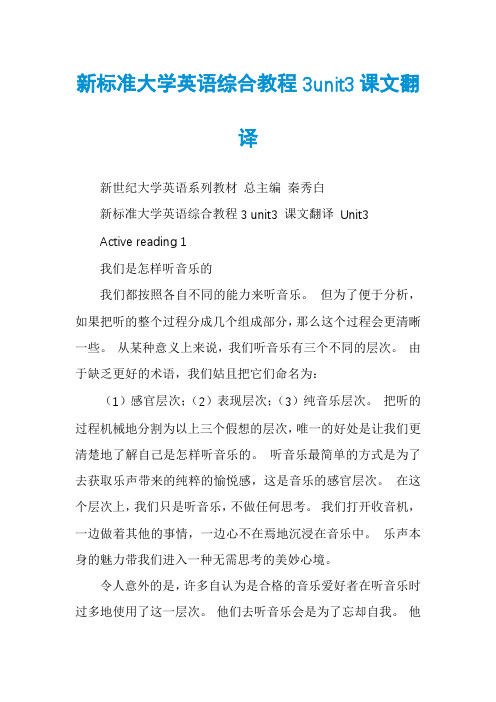
新标准大学英语综合教程3unit3课文翻译新世纪大学英语系列教材总主编秦秀白新标准大学英语综合教程3 unit3 课文翻译Unit3Active reading 1我们是怎样听音乐的我们都按照各自不同的能力来听音乐。
但为了便于分析,如果把听的整个过程分成几个组成部分,那么这个过程会更清晰一些。
从某种意义上来说,我们听音乐有三个不同的层次。
由于缺乏更好的术语,我们姑且把它们命名为:(1)感官层次;(2)表现层次;(3)纯音乐层次。
把听的过程机械地分割为以上三个假想的层次,唯一的好处是让我们更清楚地了解自己是怎样听音乐的。
听音乐最简单的方式是为了去获取乐声带来的纯粹的愉悦感,这是音乐的感官层次。
在这个层次上,我们只是听音乐,不做任何思考。
我们打开收音机,一边做着其他的事情,一边心不在焉地沉浸在音乐中。
乐声本身的魅力带我们进入一种无需思考的美妙心境。
令人意外的是,许多自认为是合格的音乐爱好者在听音乐时过多地使用了这一层次。
他们去听音乐会是为了忘却自我。
他们把音乐当成一种慰藉,一种逃避,由此他们进入了一个可以忘却日常生活的理想世界。
当然,他们也没有在思考音乐。
音乐允许他们离开现实,到另一个地方去做梦,因为音乐而做梦,做有关音乐的梦,却从没有真正欣赏过音乐。
的确,乐声的魅力是一种强大而原始的力量,但是你不该让它占据你过多的兴趣空间。
感官层次是音乐的一个重要层次,非常重要,但并不是音乐的全部。
音乐存在的第二个层次就是我所说的表现层次。
一提到这个问题,我们新世纪大学英语系列教材总主编秦秀白马上就进入到一个颇具争议的领域。
作曲家总是设法避开有关音乐表现方面的讨论。
斯特拉温斯基不是曾经声称他的音乐是一个“物体”,是一件有自我生命的“东西”,除了纯音乐性的存在之外没有任何别的含意吗?斯特拉温斯基这种不妥协的态度可能源于这样的一个事实:有那么多的人尝试着从众多的音乐作品中读出完全不同的含意。
确实,要准确地说出一部音乐作品的含意已经很难了,要肯定并确定地说出来,还要使每个人对你的解释都感到满意,是难上加难。
- 1、下载文档前请自行甄别文档内容的完整性,平台不提供额外的编辑、内容补充、找答案等附加服务。
- 2、"仅部分预览"的文档,不可在线预览部分如存在完整性等问题,可反馈申请退款(可完整预览的文档不适用该条件!)。
- 3、如文档侵犯您的权益,请联系客服反馈,我们会尽快为您处理(人工客服工作时间:9:00-18:30)。
我们是怎样听音乐的
我们都按照各自不同的能力来听音乐。
但为了便于分析,如果把听的整个过程分成几个组成部分,那么这个过程会更清晰一些。
从某种意义上来说,我们听音乐有三个不同的层次。
由于缺乏更好的术语,我们姑且把它们命名为:(1)感官层次;(2)表现层次;(3)纯音乐层次。
把听的过程机械地分割为以上三个假想的层次,唯一的好处是让我们更清楚地了解自己是怎样听音乐的。
听音乐最简单的方式是为了去获取乐声带来的纯粹的愉悦感,这是音乐的感官层次。
在这个层次上,我们只是听音乐,不做任何思考。
我们打开收音机,一边做着其他的事情,一边心不在焉地沉浸在音乐中。
乐声本身的魅力带我们进入一种无需思考的美妙心境。
令人意外的是,许多自认为是合格的音乐爱好者在听音乐时过多地使用了这一层次。
他们去听音乐会是为了忘却自我。
他们把音乐当成一种慰藉,一种逃避,由此他们进入了一个可以忘却日常生活的理想世界。
当然,他们也没有在思考音乐。
音乐允许他们离开现实,到另一个地方去做梦,因为音乐而做梦,做有关音乐的梦,却从没有真正欣赏过音乐。
的确,乐声的魅力是一种强大而原始的力量,但是你不该让它占据你过多的兴趣空间。
感官层次是音乐的一个重要层次,非常重要,但并不是音乐的全部。
音乐存在的第二个层次就是我所说的表现层次。
一提到这个问题,我们马上就进入到一个颇具争议的领域。
作曲家总是设法避开有关音乐表现方面的讨论。
斯特拉温斯基不是曾经声称他的音乐是一个“物体”,是一件有自我生命的“东西”,除了纯音乐性的存在之外没有任何别的含意吗?斯特拉温斯基这种不妥协的态度可能源于这样的一个事实:有那么多的人尝试着从众多的音乐作品中读出完全不同的含意。
确实,要准确地说出一部音乐作品的含意已经很难了,要肯定并确定地说出来,还要使每个人对你的解释都感到满意,是难上加难。
但我们不该因此走到另一个极端,不能去剥夺音乐“表现”的权利。
可能的话,你不妨听听巴赫的《平均律钢琴曲集》中的48个赋格主题。
依次地、一个个地听听其中的每一个主题,你很快就会意识到每个主题都反映了一个不同的情感世界,你很快也会意识到你越觉得某个主题美妙,就越难找到令你完全满意的字眼来描述它。
是的,你当然知道那个主题是欢快的还是悲伤的。
换句话说,你能够在脑海中勾勒出那个主题的情感框架。
那么就更仔细地听一下这个悲伤的主题吧,要明确悲伤的性质。
是悲观厌世的悲伤,还是无可奈何的悲伤?是时运不济的悲伤,还是强颜欢笑的悲伤?
假设你很幸运,能用许多词句充分表达你对选中主题的确切理解。
但这仍然无法保证其他人对你的理解都感到满意,他们也完全没有必要感到满意。
重要的是,每个人能亲自感受某个主题的表现力,或以同样的方式去感受一部完整的音乐作品独特的表现力。
如果是一部伟大的音乐作品,就别指望每次去听它都能给你带来相同的感受。
音乐存在的第三个层次是纯音乐层次。
除了令人愉悦的乐声及其所表现的情感之外,音乐也因其音符本身以及对音符的处理而存在。
多数听众都没有充分认识到音乐的这第三个层次。
对我们所有人来说,更加充分地认识这个纯音乐层次非常重要。
毕竟乐曲使用的是实实在在的音乐材料。
聪明的听众一定要做好准备,随时提升自己对音乐材料以及这些材料的使用的理解。
他必须要更加有意识地倾听音乐的旋律、节奏、和弦及音色。
但最重要的是,为了能够跟上作曲家的思路,他还必须了解一些音乐形式方面的知识。
去听所有这些成分就是在纯音乐层次上欣赏音乐。
让我重复一遍,我仅仅是为了讲解得更清楚才把听音乐的三个层次机械地分割开来的。
事实上,我们从来都不会只在其中的一个层次上听音乐。
我们其实是把它们联系起来,同时在三个层次上听音乐。
这并不需要付出多少脑力,因为我们是凭本能这么做的。
也许,用去剧院看戏来作类比,能使这种本能的联系更加明白易懂。
在剧院里,你能注意到男女演员、服装和布景、声音和动作。
这些东西组合在一起,会让我们觉得剧院是一个令人愉悦的地方,它们构成了我们欣赏戏剧的感官层次。
戏剧的表现层次来自于你看舞台表演时获得的感受。
它激起你的怜悯、兴奋或是愉悦。
正是这种笼统的感觉,除了听台词所感受到的,主要是存在于舞台上的某种情感的东西,与音乐的表现性相类似。
剧情以及剧情的发展相当于我们所说的纯音乐层次。
剧作家塑造和发展戏剧人物的方式,和作曲家创造和发展主题的方式是一样的。
你能否成为一个聪明的听众,取决于你对剧作家或音乐家处理艺术材料的手段的了解有多深。
显然,看戏的人从来就不会单独注意到这其中的一个元素。
他是同时注意到了一切。
听音乐的道理也是一样的,我们同时地、不假思索地在三个层次上倾听音乐。
